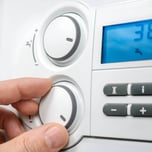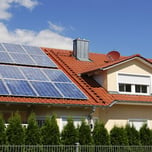Answer these simple questions and we will find you the BEST prices
Which type of solar quotes do you need?
It only takes 30 seconds
100% free with no obligation

Get up to 3 quotes by filling in only 1 quick form

Slash your energy bills by installing an energy efficient boiler

We’ve helped over 500,000 homeowners reduce their carbon footprint
- GreenMatch
- Boilers
- Types of Boilers
Types of Boilers Explained: Combi, System & Regular (2025)

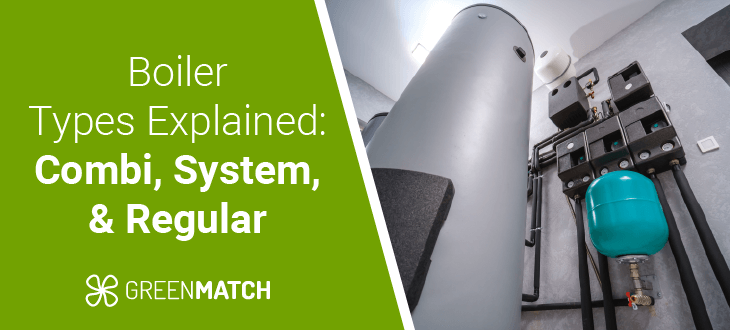
- There are 3 main types of boilers in the UK: Combi, system, and conventional or regular boilers.
- Combi boilers are the most appropriate for providing hot water on demand for smaller homes.
- System boilers are better suited for large homes with higher hot water demand.
- Regular/conventional boilers can be inefficient and their components take up a lot of space, but they can provide a high water capacity.
Boilers are like the brainy wizards of the heating world. They solve the problem of freezing homes by generating hot water or heat, leaving us warm and cosy while controlling energy bills! However, deciding between the many types of boilers can be taxing, so we’re here to help.
In this article, we'll dig into the different types of boilers and their features so you can find the perfect match for your home. While we provide prices for different types of boilers, these estimates can vary based on your situation. That’s why it’s best to consult a professional.
Looking for a trusted expert can cost you valuable time. Moreover, even after days of browsing and reaching out to installers, you could still have no actionable information at your fingertips.
Thankfully, we can make things easier. Simply fill out our 30-second form, and we’ll provide up to 3 quotes from our network of trusted boiler installers. Our service is free, without obligation, and takes as little as 30 seconds. Click the link below to get started.
- Quotes from local engineers
- Payment by finance available
- Save up to £975
It only takes 30 seconds



What are the different types of boilers?
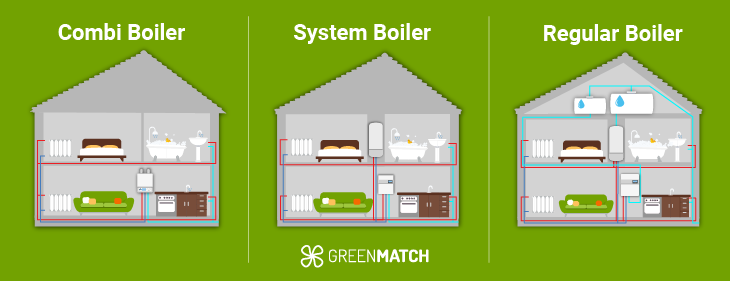
There are 3 main types of boilers in the UK: combi boilers, system boilers, and "conventional" or regular boilers.
Combi boilers, or combination boilers, are the most popular with UK homeowners. They are energy-efficient and provide both heating and hot water on demand without needing a separate water-tank.
System boilers are another favourite, known for their simplicity and ease of installation. They work with a separate hot water cylinder and suit larger households with higher hot water demands.
Conventional boilers come with a hot water cylinder and a cold water storage tank. They are an excellent choice for homes with low water pressure as they can supply substantial amounts of hot water to multiple taps.
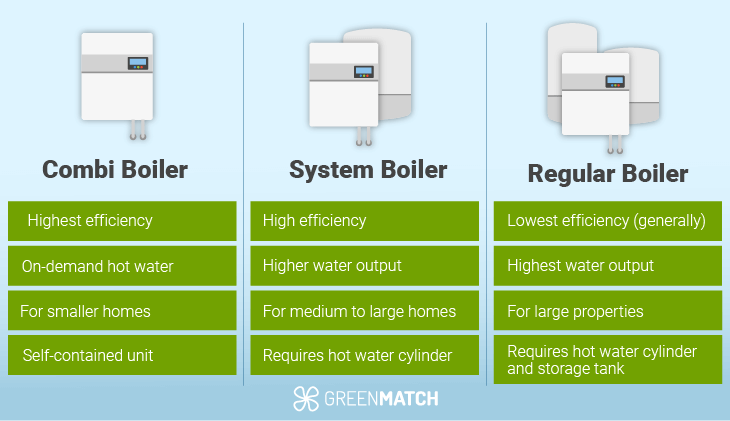
Worth noting, that since 2005 all gas types of boiler systems installed in the UK are required by law to be condensing boilers. It’s highly advisable to consult a qualified boiler installer to make sure that your boiler meets all current requirements and regulations.
There are hundreds of types of boilers in the UK, and whichever one you choose will be a costly investment. Thankfully, the UK government offers boiler grants that can help reduce the initial spending while getting a new boiler for your home. This way, getting a boiler becomes pretty affordable for any homeowner.
These three domestic boiler types have pros and cons, and choosing the best boiler for your needs and property requirements is vital. Let’s take a closer look at these boiler types.
What is a combi boiler?
A combi boiler, short for combination boiler, is a compact unit that integrates home heating and an on-demand hot water supply. It operates by drawing water directly from the mains and heating it as needed.
When you activate the heating, the combi boiler's electric ignition uses the fuel – gas, oil, or LPG (liquid petroleum gas) – in a sealed section inside the boiler.
The primary heat exchanger within the boiler is then heated, raising the incoming water's temperature to around 60℃. This heated water circulates through the radiators, providing warmth to your home.
When you require hot water, such as when you turn on a hot tap or bath, the combi boiler immediately heats the water on demand. It utilises primary and secondary heat exchangers for this purpose.
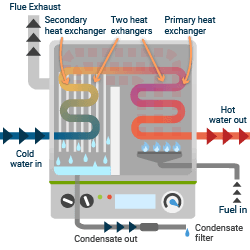
- A primary heat exchanger is responsible for heating water used for central heating. It transfers heat from the combustion process to the water flowing through the central heating system, like radiators or underfloor heating.
- A secondary plate heat exchanger is dedicated to heating water for domestic use. It transfers heat from the primary heat exchanger to the water flowing through taps, delivering instant hot water.
Combi boilers are highly energy-efficient, with electric combi boilers reaching a whopping 100% efficiency. Their small size, absence of a hot water storage tank, and ability to provide instant hot water make them a top choice among UK homeowners.
They are suitable for small to medium-sized homes with lower hot water and heating demands. However, for optimal performance, ensure sufficient mains water pressure.
Pros and cons of combi boilers
- Energy efficient
- Space-saving
- Instant hot water supply
- Cost-effective
- Limited hot water supply
- Not suitable for weak water pressure
- Not suitable for larger properties
Advantages:
- Energy efficiency: Combi boilers boast remarkable energy efficiency, with some models achieving nearly 100% energy utilisation.
- Space-saving: Combi boilers are especially suitable for small homes or properties with limited space since they eliminate the need for a hot water storage tank and a cylinder.
- Instant hot water supply: Combi boilers provide hot water instantly, eliminating the need to wait for a tank to heat up.
- Cost-effectiveness: Combi boilers serve as a cost-effective heating system, making them an excellent option for homeowners looking to reduce their heating expenses. On top of that, due to its compact size, the cost of moving a boiler of this type won't cost you a lot.
Disadvantages:
- Limited hot water supply: Combi boilers may struggle to meet high demands for hot water, particularly in larger homes with multiple water-taps.
- Unsuitable for weak mains water pressure: Combi boilers require robust mains water pressure to function effectively, which may render them unsuitable for homes with low water pressure.
- Unsuitable for larger homes: Combi boilers are only appropriate for small to medium-sized homes.
Think that a combi boiler is what you need? You should consult a professional installer regarding boiler prices since they can help choose a perfect match. However, this can take days of research.
Fortunately, we can save you lots of time. Simply complete our 30-second form. We’ll connect you with up to 3 local heating engineers so you can compare their prices without committing to any orders. Just click the button below to begin.
Fortunately, we can save you lots of time. Simply complete our 30-second form. We’ll connect you with up to 3 local heating engineers so you can compare their prices without committing to any orders. Just click the button below to begin.
- Quotes from local engineers
- Payment by finance available
- Save up to £975
It only takes 30 seconds



What is a regular/heat-only boiler?
A conventional boiler, also known as a regular or heat-only boiler, follows a traditional heating system with hot and cold water storage tanks.
The boiler's electric ignition utilises the fuel (mains gas, oil, or LPG) to heat the primary heat exchanger. This heats the incoming water, providing warmth through the radiators. This makes it one of the most space-consuming types of gas boilers.
For hot water needs, the conventional boiler heats the water in a hot water cylinder located in an external storage. It can supply hot water to multiple outlets simultaneously, making it suitable for larger households.
Conventional boilers require space for the cylinder and cold water tank, and the stored water may lose heat over time, impacting efficiency. Installation can also be more complex and costly due to additional components and pipework.
This is why conventional boilers are better for larger households with high hot water demands and areas with low water pressure. They offer simultaneous hot water supply but need space for tanks. Whether you need a regular, heat-only or system boiler will primarily depend on how much space you can spare for additional components.
Pros and cons of conventional boilers
- Suitable for low-pressure areas
- Multiple-outlet hot water delivery
- Compatible with solar panels
- Need more space
- Delayed water supply
- Tend to lose heat
Advantages:
- Suitable for low-pressure areas: Conventional boilers are well-suited for homes with low water pressure, utilising gravity-fed water from a water-tank to create the necessary pressure.
- Multi-outlet hot water delivery: Conventional boilers can efficiently provide hot water to several water-taps or outlets simultaneously, making them ideal for larger households.
- Solar panel compatibility: Conventional boiler systems can be integrated with solar thermal panels, offering more cheaper, electric heating options.
Disadvantages:
- Space requirements: Conventional boilers occupy a considerable amount of space in a home because they require a hot water cylinder and a cold water tank.
- Delayed hot water supply: Unlike combi boilers, conventional boilers require time to heat up the stored water in the cylinder, resulting in a delay before hot water becomes available.
- Heat loss: The hot water stored in the cylinder may experience heat loss over time, potentially reducing the overall boiler efficiency.
Consulting with a heating professional can help determine the best boiler brands, type and size for your specific needs. We can save you hours of research time and offer you more information so you can make the best decision for your home.
If you're interested in more details about conventional boilers, just fill out the contact form below. We will provide you with up to 3 quotes from our trusted installers. GreenMatch services are free and there is no obligation to accept any of the quotes you receive. Click below to get started!
- Quotes from local engineers
- Payment by finance available
- Save up to £975
It only takes 30 seconds



What is a system boiler?
A system boiler operates similarly to a conventional boiler but directly draws cold water from the mains, eliminating the need for water tanks. It produces hot water for a storage cylinder to heat the central heating system.
When the heating is activated, the system boiler's electric ignition uses the fuel (mains gas, oil, or LPG) inside the boiler. The primary heat exchanger heats the incoming water, which then flows through the radiators and provides heat to your home.
When hot water is needed, the system boiler heats the water in a hot water cylinder, which is usually concealed in a cabinet. This type of boiler has fewer components than a conventional model but still more than a combi.
System boilers draw water directly from the mains and heat it in the cylinder, providing a mains pressure supply to several taps simultaneously, making them suitable for larger families and homes with several simultaneous water taps.
However, they require time to heat the water in the cylinder, delaying hot water. Additionally, their installation can be more complex and costly due to extra components and pipework. A system boiler is an excellent choice for larger homes with high hot water demands. Moreover, it offers mains pressure hot water and compact size.
Pros and cons of system boilers
- Pressurised hot water supply
- Suit larger homes
- Space-efficient
- Compatible with solar panels
- Delayed hot water availability
- Heat loss
- Complex and costly installation
- Unsuitable for weak water pressure
Advantages:
- Pressurised hot water supply: System boilers utilise water from the mains, heating it in a hot water cylinder to provide a continuous flow of hot water at mains pressure to multiple taps simultaneously.
- Ideal for larger homes: System boilers are well-suited for spacious residences or homes with numerous water outlets, ensuring sufficient hot water supply throughout the property.
- Space-saving design: System boilers don’t rely on water tanks in the loft, making them a space-efficient heating option (compared to conventional boilers), especially for homes with limited space.
- Compatibility with solar panels: System boiler systems can be integrated with solar thermal panels, enabling you to adopt more sustainable heating alternatives.
Disadvantages:
- Delayed hot water availability: System boilers require time to heat the water stored in the cylinder, delaying obtaining hot water at the taps.
- Heat loss: The stored hot water in the cylinder can experience heat loss over time, potentially reducing the system's overall energy efficiency.
- Complex and costly installation: Installing a system boiler system may involve additional components and pipework, making the process more difficult and resulting in higher installation costs than for other boiler types.
- Unsuitable for weak mains water pressure: System boilers demand robust mains water pressure to function effectively, making them unsuitable for properties with low water pressure from the mains.
Do you think a system boiler is a perfect fit for your home? We can help find the best deal for you! With our help you can avoid the hassle of spending hours looking for installers. Fill in our quick 30-second form and we’ll connect you with up to 3 professional installers. Our service is totally free and non-binding. Just click below to begin.
- Quotes from local engineers
- Payment by finance available
- Save up to £975
It only takes 30 seconds



Which boiler type is the best for your UK home?
The best type of boiler for your UK home depends on various factors such as your household size, water pressure, hot water demand, available space, and budget.
| Household size | Best boiler type |
|---|---|
| Small to medium-sized homes with lower hot water and heating demands | Combi boilers |
| Larger households with high hot water demands | Conventional boilers or system boilers |
| Larger spaces or homes with many water outlets | System boilers |
It's important to note that every home is different, and the right boiler type for your household may differ from your neighbour's. If you are interested in installing a boiler, you’ll need boiler quotes from a professional installer to have the boiler types explained and tailored to your situation.
But how long and stressful can finding a professional be? It can take hours, days and precious weekends of independent searches to weigh up your boiler options! And still, you might not find a trusted engineer or anyone available within your location.
Fortunately, we can help you avoid hours of time and stress. Simply fill out our 30-second form, and we'll provide you with 3 quotes from certified boiler engineers near you. Our services are free and non-binding. Compare the prices with no obligation to accept any of the quotes you receive. Click below to begin.
FAQ
Combi, system and conventional boilers are the most common boiler types in the UK. Consult a heating expert to find out which boiler matches your housing requirements.
Condensing boilers include combi boilers. Despite misconceptions, modern combis are usually condensing boilers.
The answer depends on your housing situation. Different boiler types suit different properties. Combi boilers are best for smaller homes, while system and regular units are perfect for bigger households.
One of the most common types of boilers in the UK is combi boilers. This boiler type has its pros and cons, and it’s best to choose one together with a professional boiler installer.


We strive to connect our customers with the right product and supplier. Would you like to be part of GreenMatch?

Stay up to date with energy saving tips and grant alerts
Receive offers, marketing and promotions via email from Leads.io about GreenMatch and our brands/partners to help you save.
Thank you for subscribing to our newsletter!
Your email has been successfully added to our list. We look forward to sharing our latest updates with you soon!



